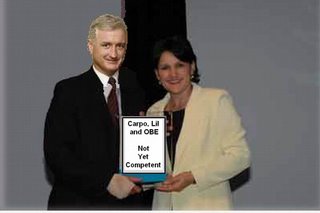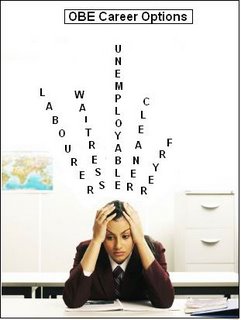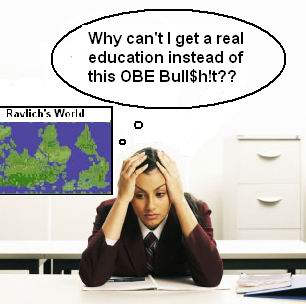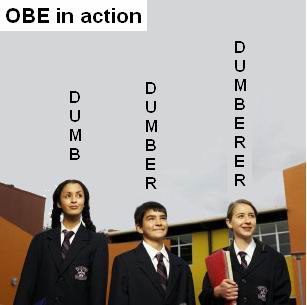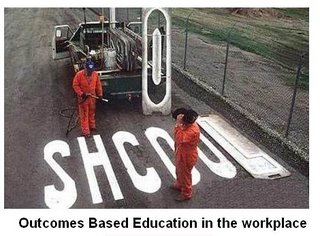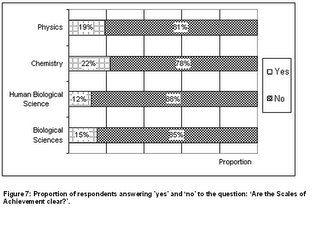Outcomes Based Education is currently a contentious topic in Western Australia.
The state labour government is planning on replacing the traditional Tertiary Enterance Examination (TEE) system with a system called the Courses of Study (COS).
At the commencement of 2006 four courses were introduced, these courses were Aviation, English, Engineering and Media.
A further 20 courses were to be introduced by the commencement of 2007 but fortunately the level of teacher outrage was far greater than the government had expected and the courses will be delayed by another year while the courses are rewritten to a satifactory standard.
The main difference between OBE and traditional education systems is two-fold:
1) Assessments are not marked in a regime where a percentage can be used, instead students must address outcomes and they are awarded levels. There is no failure in OBE.
2) There is no syllabus, instead any teacher or student can go in any direction in any subject. The students must only address the outcomes.
In order for teachers to award a student a level the teacher must read the "outcome statements" then the "indicators of achievement" and then basically guess which level the student is working at.
The problems that were attributed to the new courses of study were mostly due the the ludicrous outcome statements provided to teachers by the Curriculum Council of WA.
Some examples of Outcome statements and Indicators of achievement are below:
EARTH AND ENVIRONMENTAL SCIENCE COS
Outcome 4: Sustainability
Students use their understanding of the Earth System and society’s need for resources to make balanced and informed decisions about personal, community and global impacts on the environment.
Level 5
The student: understands models and concepts that explain the interrelationship between Earth resources and quality of life. Explains and assesses reasons for the differing opinions in sustainable practice and how these affect social, environmental and economic management. Explains how particular decisions and actions are deemed ‘responsible’, and can assess their appropriateness for sustainable management in their homes, school and broader community.
Level 7
The student: analyses systems and applies theories to explain the interrelationship between Earth resources and quality of life. Demonstrates a willingness to rework their own understanding of earth and environmental science as a result of critically and ethically evaluating regional decisions about practices that affect social, environmental and economic management. Analyses and evaluates management plans for sustainable management in their homes, school and region and in terms of achieving policy goals and regional aims.
PHYSICAL EDUCATION STUDIES COS
Outcome 1: Physical Activity Skills
Students apply decision-making, movement, strategic and tactical skills to enhance personal participation in physical activity.
Level 6
The student: considers a wide range of variables and adjusts skills, strategic and tactical responses; and displays elements of technical proficiency in adapting and applying a wide range of specialised movement skills, strategies and tactics in changing conditions in physical activity environments.
This will be evident when students:
• select and adapt skills, strategies and tactics to counter or adjust to a changing physical environment or an opposing individual or team strategy;
• display elements of technical proficiency in applying a wide range of specialised movement skills in selected forms of physical activity; and
• apply a wide range of strategies and tactics in selected forms of physical activity.
Level 8
The student: uses skills, strategies and tactics in response to a wide range of variables that are constantly changing; and selects and applies an extensive range of highly refined skills, strategies and tactics with precision and consistency in varied and complex physical activity environments.
This will be evident when students:
• select complex skills, strategies and tactics in response to a wide range of constantly changing variables;
• apply an extensive range of highly refined movement skills with precision and consistency to maximise performance in complex environments; and
• apply an extensive range of highly refined strategies and tactics with precision and consistency to maximise performance in complex environments.
ENGINEERING STUDIES COS
Outcome 3: Engineering Technology Skills
Students use materials, skills and technologies appropriate to the engineering industry.
Level 5
The student: applies a range of technology skills and knowledge to work with materials both co-operatively and independently, applies know solution to predictable problems, recognises potential hazards in the work environment and adopts safe work practices.
(The typo in the above is as written in the CC document and is not my mistake)
Level 6
The student: applies skills and knowledge to solve a defined range of predictable problems, efficiently uses materials, operates tools and equipment considering the requirements of designs and achieving defined standards of quality and safety.
Level 7
The student: controls and manipulates processes to fulfil design specifications and applies knowledge of materials, theoretical concepts and technical skills to manage problems that achieve engineering industry standards of quality and safety.
Level 8
The student: uses a wide range of specialised technical, creative and conceptual skills to manage complex production processes, modifying and adapting them where applicable to optimise resources while achieving safety and quality standards comparable with industry and community expectations.
As you can see the complexity and verbosity of each statement renders it pretty much unusable and these are the statements that John Howard and Julie Bishop (Federal Minister of Education) have labelled as gobbledygook.
To cap it all off most subjects have 4 outcomes and 8 levels each with 4 (generally) indicators of achievement using another wee beast called an aspect (Maybe one day I'll talk more about aspects).
So calculating the total number of combinations that a teacher can use to level a child is 128 statements (some of which you have seen above).
Sound like a nightmare? Well, according to most teachers it is. No right no wrong just a level.
